Max Weber and Karl Marx - Comparison
Max Weber and Karl Marx are two of the most important thinkers in the social sciences, each offering profound insights into the nature of society, economy, and power.
SOCIOLOGYTHINKERS
Max Weber and Karl Marx are two of the most influential thinkers in the fields of sociology, economics, and political theory. Both have left an indelible mark on the way we understand society, economy, and the structures of power. While Marx is often associated with the critique of capitalism and the advocacy for a classless society, Weber is known for his analysis of the role of culture, religion, and bureaucracy in shaping modern societies. This article will explore the works and publications of both thinkers, with a particular focus on Karl Marx's impact on society, the criticisms of his theories, and the thinkers he influenced. We will also delve into Max Weber's contributions and how his ideas intersect with and diverge from those of Marx.
Karl Marx: Works and Publications
Early Life and Influences
Karl Marx (1818-1883) was born in Trier, Prussia (now Germany), into a middle-class family. He studied law and philosophy at the universities of Bonn and Berlin, where he was influenced by the works of Georg Wilhelm Friedrich Hegel. Hegel's dialectical method, which emphasizes the process of thesis, antithesis, and synthesis, would later become a cornerstone of Marx's own philosophical approach.
Major Works
The Communist Manifesto (1848): Co-authored with Friedrich Engels, this pamphlet is one of the most famous political documents in history. It outlines the principles of communism and calls for the overthrow of capitalist societies by the working class (proletariat). The manifesto ends with the rallying cry, "Workers of the world, unite!"
Das Kapital (1867): This is Marx's magnum opus, a critical analysis of capitalism. The first volume was published during his lifetime, while the subsequent volumes were edited and published posthumously by Engels. In "Das Kapital," Marx explores the dynamics of capitalist production, the exploitation of labor, and the accumulation of capital. He introduces key concepts such as surplus value, the labor theory of value, and the tendency of the rate of profit to fall.
The German Ideology (1846): Written with Engels, this work critiques the Young Hegelians and lays out the materialist conception of history. Marx argues that the economic base of society (the means of production) determines the superstructure (culture, politics, religion, etc.). This idea is central to Marxist theory.
Economic and Philosophic Manuscripts of 1844: Also known as the "Paris Manuscripts," these writings explore the concept of alienation under capitalism. Marx argues that workers are alienated from the products of their labor, from the process of production, from their own human potential, and from each other.
The Eighteenth Brumaire of Louis Bonaparte (1852): In this work, Marx analyzes the rise of Napoleon III in France and discusses the role of class struggle in political developments. He famously states, "History repeats itself, first as tragedy, second as farce."
Impact on Society
Marx's ideas have had a profound impact on society, particularly in the realms of politics, economics, and social theory. His critique of capitalism and advocacy for a classless society inspired revolutionary movements around the world, most notably the Russian Revolution of 1917, which led to the establishment of the Soviet Union. Marxist ideology also influenced the Chinese Revolution, the Cuban Revolution, and various anti-colonial movements in Africa, Asia, and Latin America.
In the realm of economics, Marx's analysis of capitalism has been foundational for the development of socialist and communist economic theories. His concepts of surplus value, exploitation, and class struggle have been used to critique the inequalities inherent in capitalist systems.
In sociology, Marx's materialist conception of history has influenced the study of social structures, class relations, and the dynamics of power. His ideas have been developed and expanded upon by later sociologists, such as Antonio Gramsci, Louis Althusser, and Immanuel Wallerstein.
Criticisms of Marx's Theories
Despite his significant influence, Marx's theories have faced numerous criticisms:
Economic Determinism: Critics argue that Marx's emphasis on the economic base as the primary determinant of social structures is overly deterministic. They contend that culture, ideology, and individual agency also play significant roles in shaping society.
Historical Inevitability: Marx's prediction of the inevitable collapse of capitalism and the rise of communism has been criticized as overly optimistic. Critics point to the resilience of capitalist systems and the failures of communist regimes as evidence against this inevitability.
Class Reductionism: Some argue that Marx's focus on class struggle overlooks other forms of oppression, such as those based on race, gender, and ethnicity. Intersectional theorists, such as Kimberlé Crenshaw, have critiqued Marx for not adequately addressing the complexities of identity and power.
Practical Implementation: The practical implementation of Marxist ideas in various countries has often led to authoritarian regimes, economic inefficiencies, and human rights abuses. Critics argue that these outcomes are inherent flaws in Marxist theory, while supporters contend that they result from deviations from Marx's original ideas.
Thinkers Influenced by Marx
Marx's ideas have influenced a wide range of thinkers across different disciplines:
Vladimir Lenin: Lenin adapted Marx's theories to the context of early 20th-century Russia, leading the Bolshevik Revolution and establishing the Soviet Union. His work, "Imperialism, the Highest Stage of Capitalism," expands on Marx's analysis of capitalism.
Antonio Gramsci: Gramsci developed the concept of cultural hegemony, arguing that the ruling class maintains power not just through economic means but also through cultural domination. His work has been influential in the fields of sociology, political theory, and cultural studies.
Louis Althusser: Althusser reinterpreted Marx's theory of ideology, arguing that ideology is not just a reflection of the economic base but also a material practice that shapes individuals' perceptions and actions.
Immanuel Wallerstein: Wallerstein's world-systems theory builds on Marx's analysis of capitalism, examining the global economic system as a complex network of core, semi-peripheral, and peripheral states.
Herbert Marcuse: A member of the Frankfurt School, Marcuse critiqued advanced industrial societies and explored the ways in which capitalism suppresses individual freedom and creativity. His work, "One-Dimensional Man," is a key text in critical theory.
Paulo Freire: Freire's work on critical pedagogy, particularly in "Pedagogy of the Oppressed," draws on Marxist ideas to advocate for education as a tool for social transformation and liberation.
Max Weber: Works and Contributions
Early Life and Influences
Max Weber (1864-1920) was born in Erfurt, Prussia (now Germany), into a wealthy and influential family. He studied law, history, and economics at the University of Heidelberg and the University of Berlin. Weber's work was influenced by a wide range of thinkers, including Immanuel Kant, Friedrich Nietzsche, and Karl Marx himself.
Major Works
The Protestant Ethic and the Spirit of Capitalism (1905): In this seminal work, Weber explores the relationship between Protestantism, particularly Calvinism, and the rise of capitalism. He argues that the Protestant work ethic, with its emphasis on hard work, discipline, and asceticism, played a crucial role in the development of capitalist economies.
Economy and Society (1922): Published posthumously, this comprehensive work covers a wide range of topics, including sociology, economics, law, and religion. Weber introduces key concepts such as social action, authority, and bureaucracy. He also develops the idea of the "ideal type," a methodological tool for analyzing social phenomena.
The Sociology of Religion (1920): In this work, Weber examines the role of religion in shaping social and economic behavior. He explores the ways in which different religious traditions, such as Christianity, Judaism, and Confucianism, influence the development of economic systems.
Politics as a Vocation (1919): In this lecture, Weber discusses the nature of political power and the role of the state. He introduces the concept of the "monopoly of legitimate violence," arguing that the state has the exclusive right to use force within a given territory.
Science as a Vocation (1919): In this lecture, Weber reflects on the role of science and scholarship in modern society. He discusses the challenges of pursuing knowledge in a world characterized by disenchantment and the loss of traditional values.
Weber's Contributions to Sociology
Weber's contributions to sociology are vast and multifaceted. He is often considered one of the founding figures of the discipline, alongside Marx and Émile Durkheim. Some of his key contributions include:
Social Action: Weber defines sociology as the study of social action, which he defines as behavior that is meaningful and oriented towards others. He distinguishes between different types of social action, such as instrumental-rational, value-rational, affective, and traditional action.
Ideal Types: Weber's concept of the ideal type is a methodological tool for analyzing social phenomena. An ideal type is a conceptual construct that highlights the essential features of a social phenomenon, allowing for comparative analysis.
Bureaucracy: Weber's analysis of bureaucracy is one of his most influential contributions. He describes bureaucracy as a rational-legal form of authority characterized by hierarchy, specialization, and impersonal rules. While bureaucracy is efficient, Weber also warns of its potential to become an "iron cage" that stifles individual freedom.
Authority and Legitimacy: Weber identifies three types of authority: traditional, charismatic, and rational-legal. He argues that the legitimacy of authority is based on the belief in its rightness, whether derived from tradition, charisma, or legal-rational principles.
Religion and Capitalism: Weber's exploration of the relationship between religion and capitalism has been highly influential. He argues that religious beliefs and practices can shape economic behavior and contribute to the development of capitalist systems.
Weber's Critique of Marx
While Weber was influenced by Marx, he also critiqued several aspects of Marxist theory:
Economic Determinism: Weber rejected Marx's emphasis on the economic base as the primary determinant of social structures. He argued that culture, religion, and individual agency also play significant roles in shaping society.
Class and Status: Weber distinguished between class (economic position) and status (social prestige). He argued that status groups, based on factors such as ethnicity, religion, and lifestyle, can also influence social stratification.
Rationalization: Weber's concept of rationalization refers to the process by which traditional and affective forms of social action are replaced by rational and calculated ones. He saw rationalization as a key feature of modern societies, leading to the disenchantment of the world and the rise of bureaucracy.
Capitalism and Religion: While Marx saw religion as an opiate that pacifies the masses, Weber argued that religion could also be a driving force behind social and economic change. His analysis of the Protestant ethic highlights the role of religious beliefs in the development of capitalism.
Max Weber and Karl Marx are two of the most important thinkers in the social sciences, each offering profound insights into the nature of society, economy, and power. While Marx's critique of capitalism and advocacy for a classless society has inspired revolutionary movements and shaped the development of socialist and communist theories, Weber's analysis of bureaucracy, authority, and the role of religion in shaping economic behavior has provided a more nuanced understanding of modern societies.
Despite their differences, both thinkers have left a lasting legacy influencing contemporary debates on inequality, power, and social change. Marx's ideas have been critiqued for their economic determinism and historical inevitability. Still, they have also inspired a wide range of thinkers and movements seeking to challenge the injustices of capitalism. Weber's work, with its emphasis on the complexity of social action and the role of culture and religion, offers a complementary perspective that enriches our understanding of the social world.
In the end, the works of Marx and Weber remind us of the importance of critically examining the structures of power and inequality in society, and of striving for a more just and equitable world. Whether through the lens of class struggle or the analysis of bureaucracy and rationalization, their insights continue to resonate in our ongoing quest to understand and transform the social world.


Max Weber and Karl Marx: A Comparative Analysis of Their Works, Impact, and Criticisms
Sociology| Sociology|Sociology
Exams| Exams|Exams| Exams| Exams|Exams
